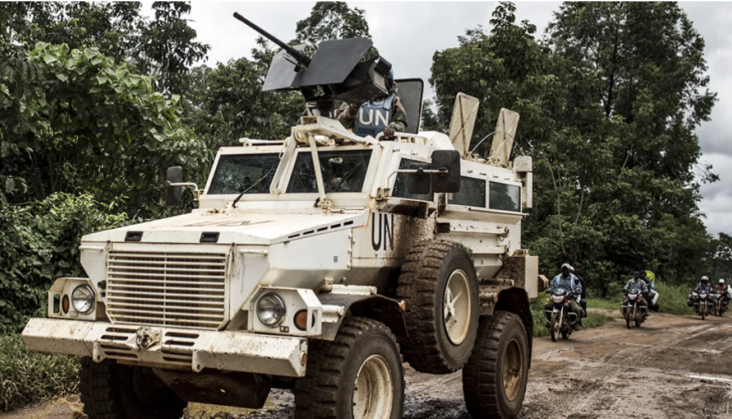[ad_1]
Confronted since the end of July with a series of demonstrations demanding the departure of the UN Mission in DRC (Monusco), the Congolese authorities have decided to harden their tone. In a letter dated 28 July, the Congolese Ministry of Foreign Affairs demanded the expulsion of the mission’s spokesman, Mathias Gillmann, whose presence on national territory is, according to the authorities, “not likely to foster a climate of mutual trust and serenity”.
“Unfair statements”
In this letter, the Monusco spokesperson is notably reproached for “indelicate and inappropriate” statements which, according to the Congolese ministry, contributed to the exacerbation of tensions, but which are not detailed in the letter. On 26 July, Patrick Muyaya, minister of communication, had already denounced “statements by various UN spokespersons that we considered clumsy and which rekindled the fire”.
Which statements is he referring to? The government does not specify in this letter, but it could be those dating from 13 July, when Monusco’s spokesman had insisted on the need to de-escalate the M23 crisis so that the mission could focus on other crises. “We don’t have the capacity to expand at will. The Congolese army does not have capacities that can be stretched at will. We do not have, contrary to what sometimes seems to be implied, thousands of soldiers who do nothing. Everyone is mobilised,” he said.
This request for expulsion comes during an already extremely tense time. Only a few days after the visit to DRC of Jean-Pierre Lacroix, head of the UN peacekeeping missions department, Félix Tshisekedi met on the evening of 1 to 2 August with several ministers and presidents of the two chambers of parliament. At the end of this meeting, the head of state officially called on the government to enter into discussions with the UN mission in order to re-evaluate its withdrawal plan, which currently foresees a 2024 departure.
Early withdrawal
Although the precise details and objectives of such dialogue have not yet been specified, several government sources assume there is a desire for the mission, which has been present in DRC since 1999, to leave sooner. A minister said that these discussions are expected to start “as soon as possible, probably after the US Secretary of State Antony Blinken’s visit”.
The article continues below

Free download
Get your free PDF: Top 200 banks 2019
The race to transform
Complete the form and download, for free, the highlights from The Africa Report’s Exclusive Ranking of Africa’s top 200 banks from last year. Get your free PDF by completing the following form
The head of US diplomacy is due to be in Kinshasa on 9 and 10 August. This visit will focus on regional security, as Blinken will discuss the ongoing conflict with Rwanda, which Kinshasa accuses of supporting the M23 in the eastern part of DRC. The future of Monusco is also expected to be discussed, as the US is one of the main donors to the peacekeeping mission.
Lowering the tension
Returning tensions surrounding Monusco’s presence marks a turning point. In difficulty under Joseph Kabila who, at the end of his term, repeatedly called for its departure, the mission had previously had a peaceful relationship with Tshisekedi. While he acknowledged certain “failures” in its 23-year presence on Congolese territory, the Congolese president nevertheless emphasised the successes and, above all, stuck to the initial withdrawal schedule.
The rising number of protests against Monusco’s presence finally led him to change direction. “There is such a disavowal among the population that we cannot remain insensitive. It is necessary to lower the tension by giving an answer to the recriminations of our populations”, says a minister privately.
Although these demonstrations are nothing new, they did increase significantly during the last week of July across several towns in the eastern part of DRC. The mission has been accused for years of being ineffective in addressing the insecurity that ravages this part of the country, where several dozen armed groups are active. The situation has recently worsened with the resurgence of the M23, which has been fighting the Congolese army in North Kivu for several months.
Some of these protests have even resulted in some of the mission’s facilities being looted. The latest death toll from the Congolese authorities is 36, including four peacekeepers. Tensions rose again on 31 July following an incident at a border post in Kasindi, near Uganda, where UN soldiers opened fire to force a passage, killing three people in the process.
[ad_2]
Source link
